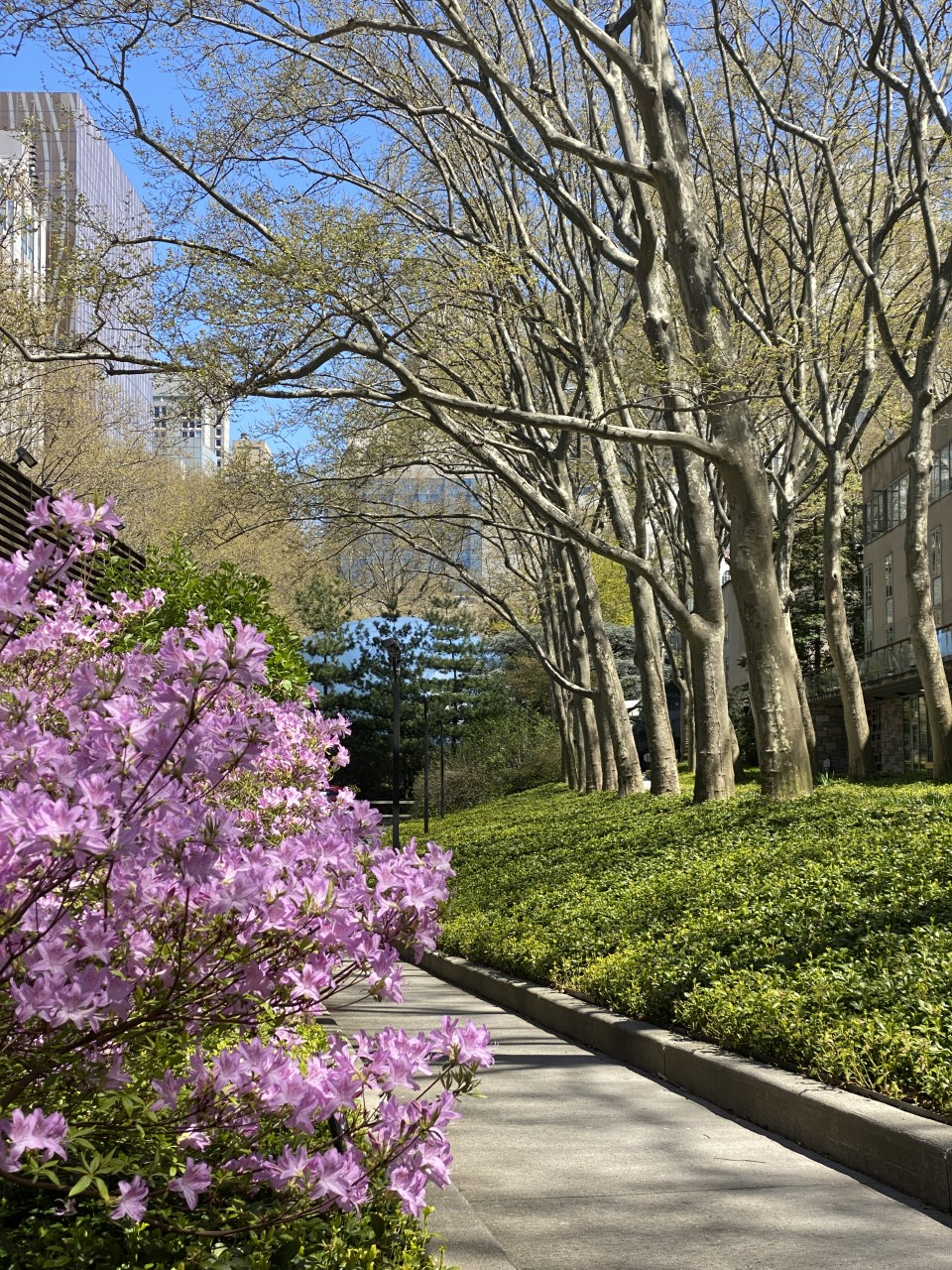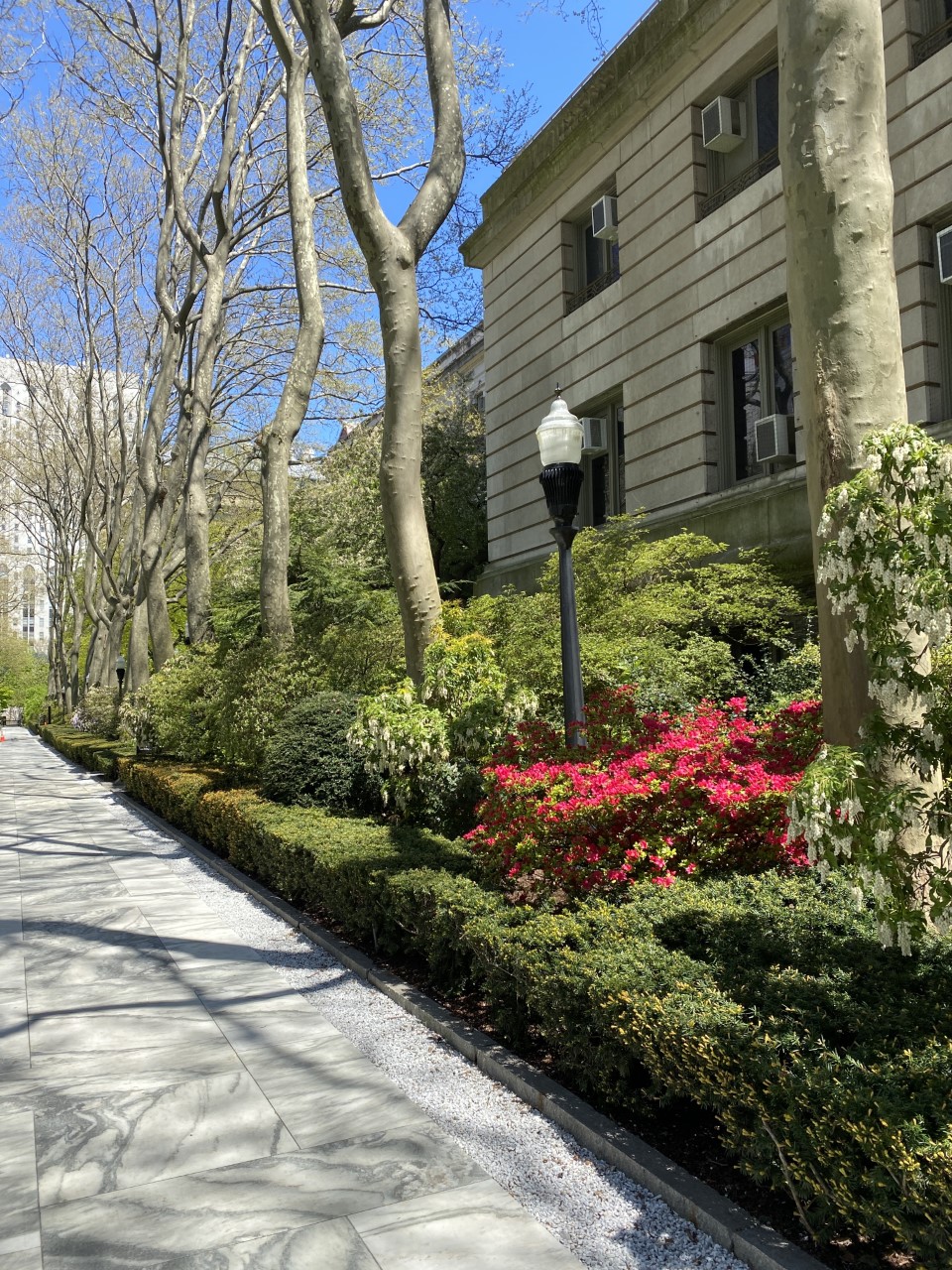This message was sent to the Rockefeller community from the Office of the President on April 30, 2020 at 9:48 a.m.
Subject: COVID-19 update from the president

Dear Colleagues,
I hope this message continues to find you and your families safe and well. Spring has arrived at Rockefeller and the campus is in full bloom. Please see the photos below to enjoy the university’s beautiful landscaping—virtually, for now.
The data on COVID infections in New York has been improving steadily, with new hospitalizations for COVID-19 falling from more than 3,000 per day on April 3 to less than 1,000 per day now, and deaths from the disease also dramatically falling. I’m pleased to report that our Office of Health Services also notes there are now fewer people being monitored for symptoms suggestive of COVID-19 or as contacts of people known or suspected of having COVID-19, with 11 people being monitored today vs. 48 on March 30. It is clear that the social distancing, stay at home and isolation policies have been effective. My thanks to all of you for your continued dedication to preventing the spread of infection by hand-washing, mask-wearing, and social distancing.
As we continue to monitor progress throughout the city and our community, in keeping with Governor Cuomo’s plans for the state, we are also beginning to contemplate a gradual re-opening of campus. The Governor has suggested this week that he will recommend starting with phase 1 of reopening for parts of the state that have not been hard-hit by COVID-19 after May 15, with other parts to follow.
Yesterday we had the first meeting of the Rockefeller University Research Restart Committee (RU-RRC), co-chaired by Executive Vice President Tim O’Connor and HOL Mike Rout, Chair of Academic Council. This committee, which includes members of the faculty and administration—see RU-RRC Members—will review guidelines and emerging best practices, monitor COVID-19 metrics at the state and local level, and establish milestones and define phases in which specific research and support activities may begin again. Reopening in phases allows interim assessments of how the effort is going, and if the rate of infection is increasing, course corrections can be implemented before the hard-won gains of the last 6 weeks are lost. The reopening of lab activity needs to be accompanied by increase in support services, including personnel to receive shipments, collect biowaste, maintain facilities, respond to emergencies, and handle hundreds of other details that cannot be done remotely. The RU-RRC will help think through these complexities, and the Emergency Preparedness and Response Committee (EPRC), chaired by Amy Wilkerson, which has done an exemplary job in planning and executing the current university operations, will continue to play a vital role.
Despite the closure, great science has continued on campus. Jean-Laurent Casanova has been studying patients from around the world who have unexpectedly severe outcomes from infection, looking for mutations in the human genome that impair the ability to combat infection with this virus. The results of this study may identify mutations that impair ability of cells to prevent infection or replication of the virus, but may also identify mutations that impair the immune system’s ability to attack the virus or infected cells. Early successes are emerging from these studies. Tarun Kapoor’s and Seth Darst’s labs have teamed up to tackle development of inhibitors of enzymes that are essential for viral replication—the SARS-CoV-2 RNA-dependent RNA polymerase and the helicase enzyme that unwinds double stranded RNA to allow replication.
It is gratifying to hear the many ways in which our community has remained productive. Classes continue online, seminars have been converted to webinars, and members of our scientific community continue to write and publish. Over 3,000 Zoom meetings have been hosted by Rockefeller faculty, students, and staff since mid-March, suggesting that people continue to work together and share ideas—as well as gather for socializing, fitness, and meditation. Online wellness programs set up by Human Resources now include six live exercise classes and three live mindfulness sessions each week as well as many other resources. See their weekly Tuesday RUConnected e-mail for details.
There will be much more to discuss in future weeks. For now, I urge you to continue to stay at home, and when you must go out, maintain social distancing and wear a mask. This will help ensure your safety, and help continue to drive down the risk of infection in our community.
Finally, I’d like to acknowledge an inspiring grass-roots effort by Lisa Polak from Elaine Fuchs’ lab. Lisa and her “makers collective” team of friends and colleagues have hand-sewn and delivered over 500 fabric masks to health care professionals who have found protective gear in short supply. Thank you, Lisa! I encourage everyone to continue to find ways to support one another in the Rockefeller community and in your local communities.
With all best wishes,
Rick
Richard P. Lifton, M.D., Ph.D.
Carson Family Professor
Laboratory of Human Genetics and Genomics
President
The Rockefeller University

